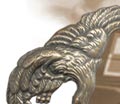 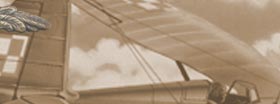 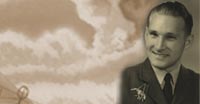 |
|||||||||
|
|
It is interesting to note the War Office instruction indicated the contents of the revocation order were not to be discussed with the press with special centres run by the constabulary to deal with the discharge. Here the Police were given instruction to deal also with those who had set up businesses illegally or had been deserters and had no correct documentation to complete the discharge process. These would be automatically ‘struck off’ and issued National Identity cards and National Insurance numbers in order to obtain employment and most important – ration cards. Women who had been in the ATS were treated differently as they were seen not to have been in ‘essential jobs’ i.e combat.
(Pages 143-145 of original document)
It is a big task to organize mobilization of the army in the case of an outbreak of war. It is an even bigger task and more complicated to discharge the army back into civilian life. The majority were young men called into the army who had no professions. Efforts were made to retrain them. It was done in the British Army and the same efforts were encouraged by the British Government to do the same in the Polish Army. Various courses were planned and organized for this purpose.
In my unit an agricultural course was planned and its organization was put into action a few months before my arrival in Crieff. There were quite a lot of private soldiers who had come from farming communities and it was expected that they would go back to their own profession in one or other form after discharge.
I heard about this planned agriculture course one day from my friends. I expressed my interest in it and said that I worked in Poland in the educational department of agriculture and that I had some experience in it. I did not go any further in these comments and in fact I forgot all about them. A few days later I was called to my new commanding officer for further questioning on the matter. I was asked also if I would be willing to offer my help in the project so I did. I had it in my mind to assist the man, an officer who was educated with a University Degree and who was responsible for organizing the course. A few days later I was called again and asked to take over the preparation of the course because the officer responsible for its organisation had asked to be relieved of his duties. He had admitted that he had no experience in agricultural education and he had no idea how to run the course. So I took over his duty. My colonel asked me how much time I would need to be ready to start. I said a fortnight. I did not think that he believed me and I was not sure myself either so I added that this was provided that I had help in preparing rooms ready for classes and teachers able to take over their subjects.
I took responsibility for the preparation of programme skeletons to be finished by the teachers according to the discussions on each subject. I was then shifted to Auchterarder where the school or course was to be run. This happened on the 15th October 1945. My holiday in Crieff had not lasted long. Hard work awaited me. I was surprised how easy it was for me to recollect all the programmes of the school in which I had taught for four years in Poland. I have to admit that thanks had to go to my commanding officer, Colonel Rziedzicki, who very energetically prepared all the conditions needed for the school and his speed in getting teachers so that I could concentrate on preparing the programme itself.
When the teachers arrived I was ready to discuss all the details with them, give them their instructions, and push them to further preparation of material. To everyone's surprise the school started up on the date I had promised! Our programme served not only our school, but it was also accepted by the other schools of the same type and was used as a guide to adjust forest and gardening courses in the same way. It was adjusted to the fundamental knowledge of farming. It was timed to last for a year, and included both theory and practice.
Enthusiasm among the teachers was terrific and the atmosphere among the personnel and their teachers was very amicable. It was very relaxing to work, to return to teach our own profession. There were two classes of soldiers who also showed good interest in learning. The course lasted the year and it was a big success. The attendees at the course were subjected to exams at the end of the year and those who did pass received certificates showing they had completed and passed the course.
Meantime the events after the end of the war were developing quickly. The discharging of the army personnel continued, and the majority of soldiers both privates and non commissioned officers declared their willingness to return home to Poland. It was a different story among the officers. With the threats coming out of Poland they were most reluctant to undertake a favourable decision. As far as I could judge, originally every one of us had believed in, and been determined to return to our home country, a free country. Unfortunately it did not happen. The Yalta agreement had killed all those hopes and brought Great Britain the big task of solving the location problem of all those Poles who now decided not to go back to Poland.
I have to admit also that there was not a sign of pressure made on anyone to return. The choice was openly and freely left to each individual man to make. My decision in that matter had been taken in London before I left for Scotland. I was strongly advised by my superiors against returning to Poland in the case of the deteriorating political situation there. Also, I was the junior officer of the staff working in the office in London. The office itself had been graded as high security and was located opposite the Russian Embassy, so every one of us was expected to be well known and easily recognizable. Later, in 1946 -1947, the situation in Poland deteriorated to the extent that Mikolajczyk had to flee for his own safety. In these circumstances my decision was clearly made(i). To stay in Great Britain meant Scotland where I decided in my heart to stay.
The social conditions of life in Auchterarder were very pleasant and amicable. First I was fortunate to be billeted with a very nice family. I was received with great friendship and introduced to Scottish society. On one occasion I was invited by them to a whist drive in Auchterarder. I often played cards and I was having good luck that evening, winning with a good score till I came to one table where I met a young lady who played against me. She greeted me with a beautiful, very friendly smile, which I never forgot. She spoke to me most kindly and then the game started and she proceeded to beat me! It was the first game that evening that I had lost and so I did not get my whist prize. Instead, as the future showed, I won a much greater reward that evening although I did not realize it at that time. I won a very good friend, the companion of my life who after about four and half years became my wife, who was willing to share our hard life, especially at the beginning and who stood by me in all circumstances. She brought to me a new life(ii).
Meantime we opened the next course the following year. It was different and not to my liking. There were no private soldiers, only officers and their ages and ranges were below schooling level. For me it was not a school. Besides, the pupil element was not so interesting. Personally I lost my interest in pretending and at that time it seemed to be the right time to think about leaving the army and getting out into civilian life.
This did not take place for another year. Meanwhile on the 25th October 1947 our school was moved to Findo Gask and the existing school of the same character was integrated into Strathallan School, where I remained headmaster. In Findo Gask living conditions and work gradually deteriorated. The selection of students was now falling and the result was that teaching was less satisfactory.
Then I began to think more realistically and positively about leaving the army. I got in touch with the other reserve officer who was thinking about going into farming and who was looking for a partner. Eventually I contacted him and after many discussions and plans I decided to go into partnership with him. At that time, just after the war, it was relatively easy to buy a fifty acre farm in Kincardineshire and in April 1948 I left the army and moved to Dunthill near the village of Marykirk, to take possession of the farm we had bought.
With that date my new civilian life began in Scotland. I began to be a farmer again and a hard working life started that lasted till 1971.
(i) Those who had served in Polish forces abroad and returned to offer their services to the new state were mostly shot. (Zamoyski, 1988: 371).
(ii) My parents, Jan Walenty Walis and Margaret Wilkie Ross, were married on February 10th 1950. My brother was born on January 1st 1953, and I was born on 18th April 1957.
Ascherson, N. 1988 The Struggles for Poland. London: Pan Books.
brain candy quotations collection: Traditional Polish Saying [online] Available: (http://www.corsinet.com/braincandy/proverb.htm) [Accessed: 20-11-2003]
Cooper, L. 2000 In the Shadow of the Polish Eagle Hampshire: Palgrave.
Davies, N. (2003) Rising '44. 'The Battle for Warsaw' London: Macmillan.
Falski, Marian. n.d. Elementarz Warsawa: Panstiwe Zaklady Wydawnictw Szkolnych.
Grzebieniowski, Tadeusz. n.d. Pocket Polish Dictionary. Warsaw: Langenscheidt.
Henderson, D.M. (ed) (2001) The Lion and the Eagle Dunfermline: Cualann Press.
Hodorowicw Knab, S. 1996 Polish Customs, traditions & folklore (Rev. ed) New York: Hippocrene Books.
Horn, A. and Pietras, B. (eds) 1999 Insight Guide Poland. APA Publications GmbH & Co: London.
Jakubowski, A.A.J. (1991) Katyn. A Whisper in the Trees California: Kuma Publishing.
Ostrycharz, R. M. 2003 Polonica in Scotland Douglas, Lanarkshire [online] Available:
http://www.ostrycharz.free-online.co.uk/PolonicaDouglas.html [Accessed: 30th May 2003]
Polish Facts and Figures in World War ll [online] Available:
http://bolekchrobry.tripod.com/polishinformationcenter19391945/id9.html [Accessed 22 June 2003]
Serwis informacyjny Polskiego Stronnictwa Ludowego 1999 The Biography of Stanislaw Mikolajczyk
[online] Available: http://www.psl.org.pl/konf/biogrsm.htm [Accessed 20 July 2003]
St. Martin's Day: The Reluctant Bishop Soup and Goose [online] Available: http://www.soupsong.com/znov02.html [Accessed 7th December 2003]
The Avalon Project The Berlin (Potsdam) Conference July 17 ń August 2 1945 [online] Available:
[http://www.yale.edu/lawweb/avalon/decade/decade17.htm [Accessed 22 June 2003]
The Avalon Project The Tehran Conference December 1943 [online] Available:
http/www.yale.edu/lawweb/Avalon/wwii/tehran.htm [Accessed 22 June 2003]
The Avalon Project Yalta (Crimea) Conference February 1945 [online] Available:
http/www.yale.edu/lawweb/Avalon/wwii/yalta.htm [Accessed 22 June 2003]
The Domestic Waterfowl Club of Great Britain [online] Available: http://www.domestic-waterfowl.co.uk/roman.htm#roman [Accessed 8th October 2003]
Zamoyski, A. 1988 The Polish Way. New York: Hippocrene Books.
|
||||||||
Site hosting by Paston.
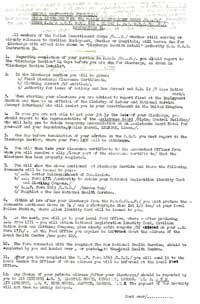
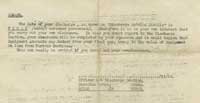
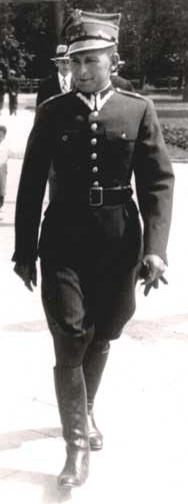 The following section has been kindly donated by Chris Bell. It forms part of a much larger story some of which we have published under
The following section has been kindly donated by Chris Bell. It forms part of a much larger story some of which we have published under